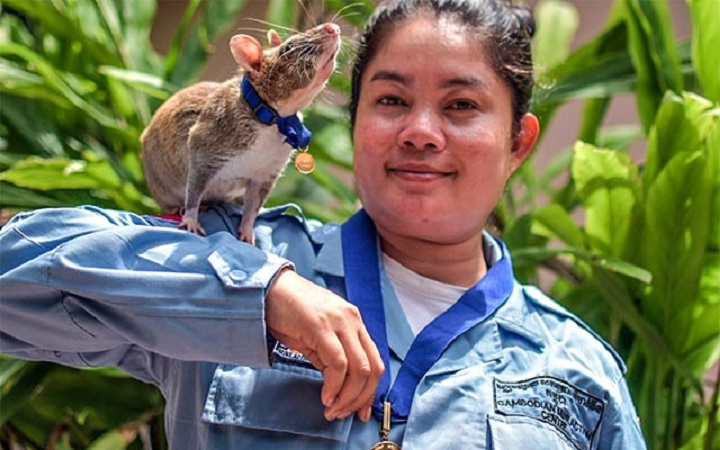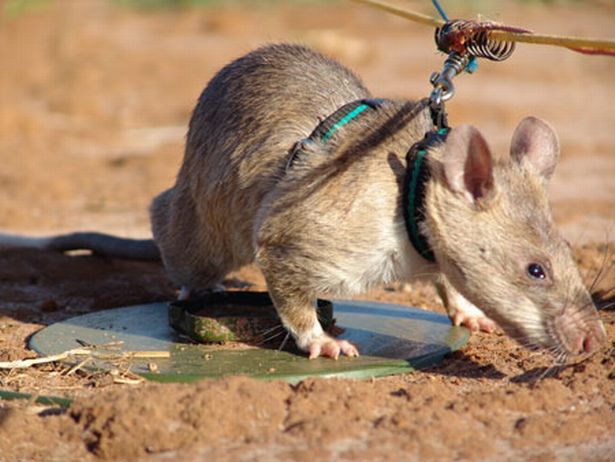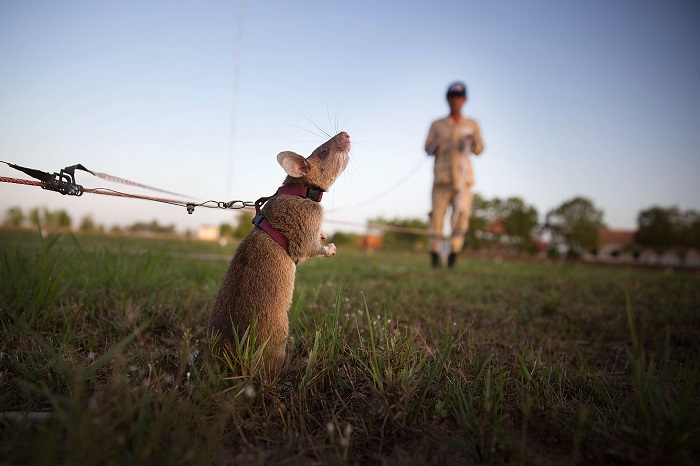In Cambodia, rats are on a mission. They are not just pests there, but heroes, for the country uses their extraordinary sense of smell to detect landmines. It is one of dozens of talented African giant pouched rats that not only save lives by locating unexploded mines, but also help attract tourists to a unique visitor centre in Siem Reap.
Before the coronavirus pandemic shut down world tourism, this small city was inundated with travellers – more than two million people visiting its renowned Angkor Archaeological Park each year. But of the many tourist attractions to have sprung up in Siem Reap, few are as significant as the rat training and visitor centre of charity Apopo.
Magawa – the super hero rat

The facility is currently in the spotlight owing to the achievements of one of its rodent alumni, Magawa. In September, this particular rat was awarded a gold medal by UK veterinary charity PDSA, for its remarkable work in Cambodia. Over its four-year career with Apopo, Magawa has located 39 landmines and 28 other unexploded ordnance, while helping clear 14 hectares of land, the equivalent of about 20 football pitches.
This is invaluable work in a country where as many as six million landmines were planted over three decades of conflict up to the late 1990s. Despite efforts to detect and clear these hidden explosives, an estimated 15,000 people are killed or maimed by landmines every year, according to the International Campaign to Ban Landmines.
The landmine crisis
Landmines also hamper the development of farming communities that cannot use fertile land because of them. Cambodia is aiming to eradicate its landmine problem within a decade, and to achieve this, it needs both rats and tourists.

Apopo has done a stellar job of attracting the tourists who come to Siem Reap to admire Angkor Wat. Its visitor centre is just off the main road that connects downtown Siem Reap to the temple complex. Tourists are welcomed by English-speaking staff who offer brief tours of the centre which, in its foyer, has a small but comprehensive museum that explains the history of Apopo and outlines the global landmine problem.
Big rats of cat size!
This rat has a thick orange stripe across the middle of its face, which almost makes it look like it is wearing a superhero mask. Which is appropriate, considering the extraordinary achievements of these rodents. The trainer places the rat in a patch of dirt, connecting its harness to a cable and letting it put on a show for its newest fans. We are roundly impressed by the speedy and organised fashion in which it sniffs every section of the space.
It is this pace of inspection that makes Apopo’s rats so effective. It takes these trained rodents only 30 minutes to search an area the size of a tennis court, something that would take four days for a human wielding a metal detector. Of course, accuracy takes precedence over speed, but Apopo’s rats are also supremely reliable at identifying unexploded landmines.

These rodents, which are too light to set off the explosive devices, are trained to use their noses to identify the chemical compounds of live TNT explosives, and ignore the scrap metal of detonated devices. Apopo currently uses them in three countries afflicted by landmines – Cambodia, Mozambique and Angola. The former is its headquarters and main focus.
Although the coronavirus pandemic has brought many things to a standstill around the world, it hasn’t slowed the progress of Apopo’s rodents. So far this year, they have helped clear more than 300 hectares of landmine-afflicted ground in Cambodia. In doing so, they are not only protecting Cambodians who walk through these areas, but also opening up opportunities to cultivate crops on this land.




![The Top & Most Popular Seafood Bucket Restaurants in Dubai for you [Never Miss]](https://uae24x7.com/wp-content/uploads/2020/09/8-seafood-in-a-bucket-scaled-e1600739237403.jpg)
![Procedures for Renewing the Driving License in Abu Dhabi [3 Simple Steps]](https://uae24x7.com/wp-content/uploads/2020/07/Capture-9-e1595666454466.jpg)





